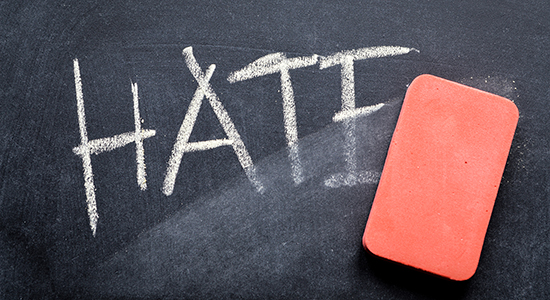
May 2, 2018 – According to the U.S. Department of Justice’s Bureau of Justice Statistics, U. S. residents experienced an average of 250,000 hate crime victimizations a year between 2004 through 2015.1
In 2017, the Wisconsin Center for Investigative Journalism discussed concerns about what appears to be increases in hate crimes and bias incidents in Wisconsin.
This article answers these questions about hate crimes: What are they? How are they defined or recognized? Who are the victims? What are examples of hate crimes? And what resources are available for Wisconsin residents who may be victims of hate crimes?
What is a "hate crime"? How do we identify or recognize it?
A “hate crime” is a traditional criminal offense, like murder, arson, or vandalism, but motivated by hate or bias.2 The Federal Bureau of Investigation (FBI) defines a hate crime as a “criminal offense against a person or property motivated in whole or in part by the offender’s bias against a protected characteristic, such as the target’s race, religion, disability, sexual orientation, ethnicity, gender, or gender identity.”3
Hateful thoughts are not a crime,4 and even hateful speech may not be a crime, but harmful conduct motivated by or stemming from that hate can run afoul of criminal laws and lead to civil damages liability.
Not every hateful or biased incident rises to the level of a hate crime. For example, discrimination in employment, housing, or public services is not a criminal act. However, it is a biased incident, which is regulated (though not discussed here) by anti-discrimination laws that are administrative or civil in nature.
What characteristics are protected by state or federal hate crime laws?
Wisconsin law:
There are four laws relevant to hate crimes in Wisconsin. Together, they protect the following characteristics: race, religion, color, disability, sexual orientation, national origin, ancestry, property used for religious purposes, facilities used for burial or memorializing the dead, schools, educational facilities, community centers, and personal property.
 Nilesh Patel, U.W. 2002, is counsel at the Day Care Council of New York and treasurer of the State Bar of Wisconsin’s Nonresident Lawyers Division.
Nilesh Patel, U.W. 2002, is counsel at the Day Care Council of New York and treasurer of the State Bar of Wisconsin’s Nonresident Lawyers Division.
 Starlyn Tourtillott, U.W. 2008, is an attorney for the Menominee Indian Tribe of Wisconsin and the Native American liaison to the State Bar Board of Governors.
Starlyn Tourtillott, U.W. 2008, is an attorney for the Menominee Indian Tribe of Wisconsin and the Native American liaison to the State Bar Board of Governors.
Wis. Stat. section 939.645 protects persons or property targeted on the basis of race, religion, color, disability, sexual orientation, national origin, or ancestry. Notably missing, however, are hate crimes motivated by gender or gender identity. This law operates as a penalty enhancer at sentencing; the underlying conduct must still be found to be a crime.
Section 943.012 protects property and belongings from vandalism or graffiti and applies to any building used for religious worship or a religious purposes, any facility used for burial or memorializing the dead, or to a school, educational facility, or community center publicly identified as associated with protected characteristics.
Personal property is protected if it has significance or value to a protected group and the perpetrator knows the property’s significance or value to the protected group.
Two Wisconsin statutes lead to collateral consequences from a hate crime. Section 895.443 allows a civil action, with general or punitive damages as well as recovery of attorney fees, for physical, emotional, or property damage suffered by victims protected under section 939.645(1) or section 943.012(1)-(4).
Under section 973.075, all property (real or personal) used or intended to be used in the course of or derived from or realized through the commission of a crime is subject to forfeiture. Any vehicle that is used to cause more than $2,500 worth of criminal damage to cemetery property in violation of section 943.012 is subject to forfeiture.
Federal law:
Five relevant federal laws regulate hate crimes.5 They protect the following characteristics: race, religion, national origin, religion, gender, sexual orientation, gender identity, disability, and religious property. Federal law also protects the exercise or enjoyment of rights and activities, such as free exercise of religious beliefs, public education, jury service, travel, or public accommodations. The relevant laws are listed below. Due to space limitations, each law is only described briefly.
Hate Crimes Prevention Act of 2009, 18 U.S.C. § 249. The Matthew Shepard and James Byrd Jr. Hate Crimes Prevention Act makes it a federal crime to willfully cause bodily injury, or attempt to do so, using a dangerous weapon, because of the victim’s actual or perceived race, color, religion, or national origin. The Act also extends federal hate crime prohibitions to crimes committed because of the actual or perceived religion, national origin, gender, sexual orientation, gender identity, or disability of any person.
Criminal Interference with Right to Fair Housing, 42 U.S.C. § 3631. This statute makes it a crime to use, or threaten to use force to interfere with housing rights because of the victim’s race, color, religion, sex, disability, familial status, or national origin.
Damage to Religious Property, Church Arson Prevention Act, 18 U.S.C. § 247. This statute prohibits the intentional defacement, damage, or destruction of religious real property, because of the religious nature of the property. The statute also criminalizes the intentional obstruction by force, or threat of force, of any person in the enjoyment of that person’s free exercise of religious beliefs.
Violent Interference with Federally Protected Rights, 18 U.S.C. § 245. This statute makes it a crime to use, or threaten to use force to willfully interfere with any person because of race, color, religion, or national origin and because the person is participating in a federally protected activity, such as public education, employment, jury service, travel, or the enjoyment of public accommodations, or helping another person to do so.
Conspiracy Against Rights, 18 U.S.C. § 241. This statute makes it unlawful for two or more persons to conspire to injure, threaten, or intimidate a person in any state, territory, or district in the free exercise or enjoyment of any right or privilege secured to him or her by the Constitution or the laws of the U.S.
Is there data on hate crimes?
Data on hate crimes is collected by community groups and by the federal government.
Advocacy groups such as the Anti-Defamation League (ADL), the Southern Poverty Law Center (SPLC), and the National Gay and Lesbian Task Force (NGLTF) began compiling data on bias-motivated violence in the 1980s while official federal data was collected starting in 1990, with the passage of the hate Crimes Statistics Act (HCSA).6 SPLC still collects data today.7
Currently, federal law requires the U.S. Attorney General to collect data about crimes that manifest evidence of prejudice based on race, religion, sexual orientation, ethnicity, disabilities, gender, and gender identity.8 There are two primary sources of federal hate crime data: the National Crime Victimization Survey (NCVS) and the Uniform Crime Reports (UCR), both administered through the U.S. Department of Justice.9
While data on hate crime exists, the current methods of data collection do not capture the true reflection of hate crime occurring today, resulting in inconsistent and incomplete data. Foremost, many incidents of hate crimes go unreported out of fear by victims.
Further, reporting of hate crime incidents by local agencies to the Federal Bureau of Investigations (FBI) (which collects and publishes UCR data) is not mandatory. As a result, “[o]f the 14,997 participating law enforcement agencies across the country, only 1,742 reported hate crime statistics to the FBI in 2015. In Wisconsin, only 25 of 395 participating law enforcing agencies submitted incident reports to the FBI.”10
What resources are available for hate crime victims?
In general, resources available to hate crime victims in Wisconsin include local state, tribal, and federal law enforcement agencies, as well as local organizations such as Seeking Tolerance and Justice Over Hate (STJOH) in the City of Madison and SPLC.
Yet, finding resources or navigating the options after a victim has just experienced a hate crime can be overwhelming.
One recent tool aims to ease the search process. The newly created “Hate Crime Help” web application is the creation of many partners, including the ABA Center for Innovation. It helps connect hate crime victims with available resources swiftly.11
Users simply need to answer four questions and they will be provided with a list of local and national organizations and government entities within their area based on the specific type of hate crime or bias incident experienced.
Victims using Hate Crimes Help for incidents in Wisconsin will now see a new state resource: The State Bar of Wisconsin Lawyer Referral Service's Anti-Bias Pro Bono Panel.
This is a new initiative of the State Bar of Wisconsin. It provides victims with a 30-minute pro bono consultation with a Wisconsin-licensed attorney, who can evaluate the facts and help the person determine how to hold a perpetrator accountable. Read more about this critical new service in the sidebar below, and how lawyers can participate.
Volunteers Sought for a Hate Crimes/Bias Incidents Hotline
The State Bar of Wisconsin has developed a new initiative, the Anti-Bias Pro Bono Panel, to assist victims of hate crimes in Wisconsin through a Hate Crimes Hotline.
Using the Lawyer Referral and Information Service (LRIS) as its platform, the State Bar will connect victims of hate crimes in Wisconsin with Wisconsin-licensed attorneys for a pro bono 30-minute consult.
The consult is limited to an intake and evaluation of the victim’s situation. The attorney will evaluate whether state or federal hate crime laws are implicated and counsel the client on whether he or she may have a criminal case or civil claim. For criminal matters, the attorney can direct the client to relevant law enforcement resources, such as the FBI or local police.
If there is a potential civil claim, the attorney is under no obligation to take the case. The client can be referred back to LRIS for a referral to a panel attorney that is able to take such civil cases. If the pro bono attorney wishes to represent the client for a civil claim, he/she must be approved as an LRIS attorney and must agree to abide by the LRIS program’s rules.
How Attorneys Can Help
The State Bar seeks attorneys willing to provide pro bono consultations through the Hate Crimes Hotline. No specific expertise is needed in hate crimes; an information packet listing the relevant laws and a sample intake form will be available for participating attorneys. Further, participating attorneys are covered by the State Bar’s professional liability insurance without any extra cost to them.
The consultation will focus on legal skills that attorneys practice regularly: client intake and interviewing, client counseling, and a legal analysis of the basic facts to make an initial determination of whether the client’s rights may have been violated.
Most importantly, attorneys understand the legal system and can cut through the maze of options to help the client take actions to obtain justice.
This initiative fills a critical need for victims of hate crimes andl allows them to hold perpetrators of hate crimes accountable. Please consider signing up as a panel attorney. The program is designed to offer flexibility to the participating attorneys.
Any Wisconsin licensed attorney may participate, including members that are non-resident, government, or in-house attorneys. Consultations can be conducted via telephone and in a very short amount of time.
For more information about this initiative, please contact Patricia Ruppert, member services manager at the State Bar of Wisconsin: (608) 250-6131 or pruppert@wisbar.org. You can also contact Attorney Nilesh Patel at (608) 239-7510 or npp@mahalawgroup.com.
Endnotes
1 Lynn Langton & Madeline Masucci, Hate Crime Victimizations, 2004 – 2015, U.S. Department of Justice, Office of Justice Programs, Bureau of Justice Statistics (June 2017).
2 See What We Investigate, Defining A Hate Crime, Federal Bureau of Investigation (last visited March 30, 2018)
3 Id.
4 Id.
5 Hate Crime Laws, U.S. Department of Justice (July 28, 2017) (last visited March 30, 2018).
6 Hate Crime and Civil Rights in Wisconsin (2017). A Report of the Wisconsin Advisory Committee to the U.S. Commission on Civil Rights. [online] p.6. [accessed March 15, 2018].
7 See #ReportHate, Southern Poverty Law Center (last visited March 30, 2018).
8 In September 1994, lawmakers amended the Hate Crime Statistics Act to include bias against persons with disabilities by passing the Violent Crime Control and Law Enforcement Act of 1994. The FBI started gathering data for the additional bias type on January 1, 1997. In July 1996, the Church Arson Prevention Act was signed into law, removing the sunset clause from the original 1990 Hate Crimes Statistics statute and mandating that the collection of hate crime data become a permanent part of the UCR Program. In October 2009, Congress further amended the Hate Crime Statistics Act by passing the Matthew Shepard and James Byrd, Jr. Hate Crime Prevention Act. The amendment includes the collection of data for crimes motivated by bias against a particular gender and gender identity. See https://www.justice.gov/crt/hate-crime-laws.
9 Hate Crime and Civil Rights in Wisconsin. (2017). A Report of the Wisconsin Advisory Committee to the U.S. Commission on Civil Rights. [online] p.11. [accessed March 15, 2018]. Also see NCVS and UCR.
10 Hate Crime and Civil Rights in Wisconsin. (2017). A Report of the Wisconsin Advisory Committee to the U.S. Commission on Civil Rights. [online] p.13. [accessed March 15, 2018]
11 See Hate Crime Help, (last visited March 30, 2018).
